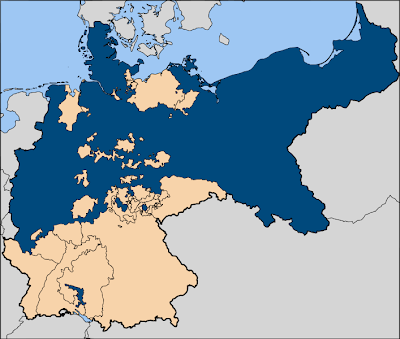
Setting the Stage for the story of Walter and Eda and how the fall of the German Confederation cost them their freedom and their lives changed forever.
Germany (1814–1871) Frankfurt Parliament in 1848.
Following the fall of Napoleon Bonaparte, the Congress of Vienna convened in 1814 and founded the German Confederation, a loose league of 39 sovereign states. Disagreement with restoration politics partly led to the rise of liberal movements, demanding unity and freedom.
The monarchs initially yielded to the revolutionaries' liberal demands. King Frederick William IV of Prussia was offered the title of Emperor, but with a loss of power; he rejected the crown and the proposed constitution, leading to a temporary setback for the movement. Conflict between King William I of Prussia and the increasingly liberal parliament erupted over military reforms in 1862, and the king appointed Otto von Bismarck the new Prime Minister of Prussia. Bismarck successfully waged war on Denmark in 1864. Prussian victory in the Austro-Prussian War of 1866 enabled him to create the North German Federation and to exclude Austria, formerly the leading German state, from the affairs of the remaining German states.
(1871–1918) German Empire and World War I
The state known as Germany was unified as a modern nation-state in 1871, when the German Empire was forged. After the French defeat in the Franco-Prussian War, the German Empire was proclaimed in Versailles on 18 January 1871. The Hohenzollern dynasty of Prussia ruled the new empire, whose capital was Berlin. The empire was a unification of all the scattered parts of Germany except Austria. Beginning in 1884, Germany began establishing several colonies outside of Europe.
In the Gründerzeit period following the unification of Germany, Emperor William I's foreign policy secured Germany's position as a great nation by forging alliances, isolating France by diplomatic means, and avoiding war. Under William II, however, Germany, like other European powers, took an imperialistic course leading to friction with neighboring countries. Most alliances in which Germany had been previously involved were not renewed, and new alliances excluded the country.
Germany's imperialism reached outside of its own country and joined many other powers in Europe in claiming their share of Africa. The Berlin Conference divided Africa between the European powers. The Scramble for Africa caused tension between the great powers that may have contributed to the conditions that led to World War I.
(1919–1933) The Weimar era was dominated by political unrest.
At the beginning of the German Revolution, Germany was declared a republic and the monarchy collapsed. However, the struggle for power continued, with radical-left communists seizing power in Bavaria, but failing to take control of all of Germany. The revolution came to an end in August 1919, when the Weimar Republic was formally established. The Weimar Constitution came into effect with its signing by President Friedrich Ebert on 11 August 1919.
Suffering from the Great Depression, the harsh peace conditions dictated by the Treaty of Versailles, and a long succession of more or less unstable governments, the people of Germany increasingly lacked identification with their political system and the "Establishment Parties" in their parliamentary democracy. The top brass of the Weimar government was accused of betraying the German Nation by signing the Versailles Treaty, while the radical left-wing communists, such as the Spartacist League, had wanted a revolution to abolish "capitalist rule" in favor of a Räterepublik, and were also targeted.
At the beginning of the German Revolution, Germany was declared a republic and the monarchy collapsed. However, the struggle for power continued, with radical-left communists seizing power in Bavaria, but failing to take control of all of Germany. The revolution came to an end in August 1919, when the Weimar Republic was formally established. The Weimar Constitution came into effect with its signing by President Friedrich Ebert on 11 August 1919.
Suffering from the Great Depression, the harsh peace conditions dictated by the Treaty of Versailles, and a long succession of more or less unstable governments, the people of Germany increasingly lacked identification with their political system and the "Establishment Parties" in their parliamentary democracy. This was exacerbated by a widespread right-wing (monarchist, völkisch, and Nazi) Dolchstoßlegende, which promoted the view that Germany had lost World War I because of the efforts and influence of those who wanted to overthrow the government. The top brass of the Weimar government was accused of betraying the German Nation by signing the Versailles Treaty, while the radical left-wing communists, such as the Spartacist League, had wanted a revolution to abolish "capitalist rule" in favour of a Räterepublik, and were also targeted.
The assassination of Austria's crown prince on 28 June 1914 triggered World War I. Germany, as part of the unsuccessful Central Powers, suffered defeat against the Allied Powers in one of the bloodiest conflicts of all time. An estimated two million German soldiers died in World War I.
Walter Born 1900 and Eda a few years before had moved from a period of freedom and comfort into a government controlled totalitarian socialist state and their parents saw the coming of yet another World War. Walter was the first to be sent to the new world, the United States. He was barely 15 when his parents arranged for his stowage on a merchant marine ship.
More to follow... Stay Tuned


No comments:
Post a Comment